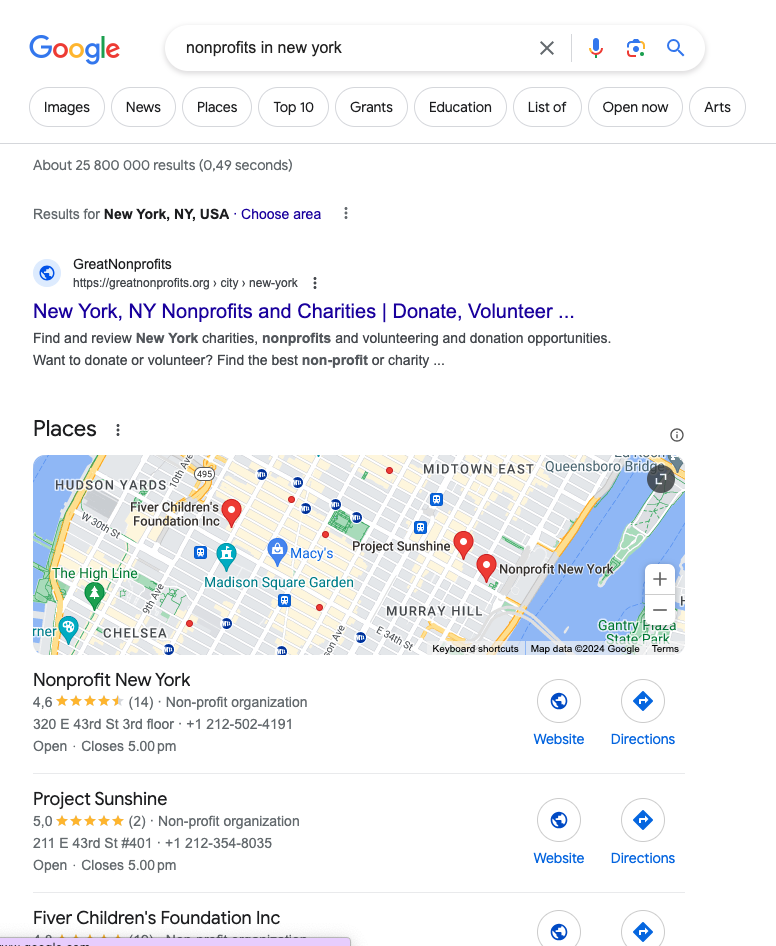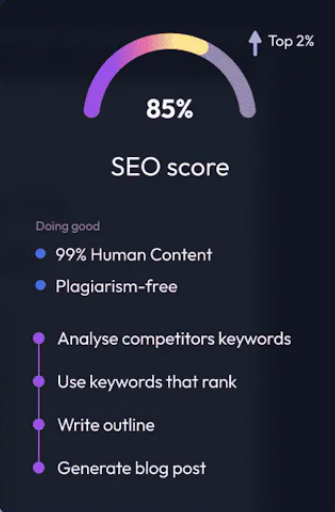
Introduction
When you run a nonprofit organization, your mission is to reach as many people as possible with your message and to rally support for your cause. In the digital age, visibility is key, and that's where search engine optimization (SEO) becomes a game-changer. An effective SEO guide for nonprofits is not just a nice-to-have; it’s an essential part of your digital strategy.
For nonprofits, SEO serves as a beacon, guiding potential supporters to your website through the crowded and often overwhelming space of the internet. By optimizing your online presence, you increase the likelihood of appearing in search engine results when individuals look for causes like yours. The benefits are twofold: Not only does this boost your visibility, but it also helps to establish credibility and trust with potential donors and volunteers.
This comprehensive guide to nonprofit SEO will equip you with the knowledge to:
- Enhance your website's visibility in search engine results
- Attract more visitors who can turn into committed supporters
- Understand how SEO can be leveraged as a cost-effective marketing tool
- Use various tools such as an AI writer like Junia AI to generate high-quality content for your website.
Embrace this guide as a roadmap to navigate the complexities of SEO. It's tailored to help nonprofits like yours amplify their voice and maximize impact in a digital-centric world.
Benefits of SEO for Nonprofits

Nonprofit organizations can greatly benefit from using Search Engine Optimization (SEO) to improve their online presence and connect with their target audience. Here are some advantages of implementing SEO strategies for nonprofits:
Attracting Visitors
By optimizing their website with relevant keywords related to their cause and activities, nonprofits can attract users who are actively searching for information or ways to get involved in similar causes. This targeted approach ensures that the website receives traffic from individuals who are more likely to engage with the organization's content and support its initiatives.
Increasing Supporters
Improved visibility in search results can lead to an increase in supporters for nonprofits. This includes not only donors but also volunteers, recurring supporters, and advocates within the community. Engaged supporters play a crucial role in spreading awareness about the organization's mission and helping it achieve its goals.
Fundraising Opportunities
Having a strong online presence through effective SEO practices can directly impact a nonprofit's fundraising efforts. When an organization ranks higher on Search Engine Results Pages (SERPs), it becomes more visible to potential donors. People often trust and prefer organizations that appear at the top of their search results, making them more likely to contribute financially.
With the right SEO strategies tailored for nonprofit organizations, it is possible to achieve significant growth in online engagement and funding opportunities. This digital elevation can make a real difference in advancing nonprofit missions worldwide.
Routine Maintenance and Strategy for Nonprofit SEO
Routine maintenance is crucial for maintaining a strong SEO presence for nonprofit organizations. Just like updating important software to keep it running smoothly, regularly attending to your SEO ensures that your nonprofit remains visible online. Here are some key tasks for routine maintenance:
- Regularly update your website content: Keep your information up to date and relevant to engage both users and search engines.
- Monitor your website's performance: Use tools like Google Analytics to track how visitors interact with your site and make improvements accordingly.
- Fix any broken links: Broken links can harm your site's reputation and impact your search rankings negatively.
While routine maintenance is important, it's not enough on its own. You also need a well-defined strategy that aligns with your nonprofit's goals. Here are the steps you should take when developing your SEO strategy:
- Set clear objectives: Clearly define what success means for your organization in terms of online visibility, user engagement, and conversions.
- Conduct keyword research: Identify the specific words and phrases that your target audience is using when searching for services or information related to your cause.
- Optimize your on-page elements: Make sure that your page titles, meta descriptions, and content include the targeted keywords and are designed for easy reading.
- Create a content calendar: Plan out a schedule for publishing new content on a regular basis to keep your audience informed and engaged.
- Track results and make adjustments: Measure the effectiveness of your strategy through key performance indicators (KPIs) such as organic traffic, conversion rates, and bounce rates. Based on these metrics, make any necessary changes to your tactics.
By combining routine maintenance with a strategic approach, you can position your nonprofit organization at the top of search engine results where potential supporters are more likely to find you. With consistent effort, nonprofit SEO can become a powerful tool for growth, helping you reach a wider audience and amplify your message effectively.
Factors Impacting Nonprofit SEO
When it comes to nonprofit SEO, there are several important factors that can influence how well your organization ranks in search engine results. By understanding and addressing these factors, you can improve your online visibility and reach more people who are interested in supporting your cause.
1. Competition

One of the key things to consider is the competition - other organizations or websites that are similar to yours and also trying to rank well in search engines. Here's what you can do:
- Identify your competitors
- Analyze the keywords they're targeting
- Study their content structure
By doing this research, you can find ways to differentiate yourself from the competition and attract attention from potential supporters.
2. Location
If your nonprofit serves a specific community or region, local SEO is especially important for you. Here are some steps you can take:
- Use location-based keywords in your website content
- Optimize your Google My Business listing with accurate address and contact information
- Encourage reviews from local supporters
These efforts can help you appear more prominently in local search results and connect with people who are more likely to get involved with local events or initiatives.
3. Technical SEO
The technical aspects of your website also play a crucial role in SEO success. Making sure that search engines can easily access and understand your site is essential. Here are some technical elements to focus on:
- Mobile responsiveness: Your site should be optimized for viewing on mobile devices.
- Fast page load times: Slow-loading pages can negatively impact user experience and search rankings.
- Clean URL structure: Use descriptive URLs that make it clear what each page is about.
- Secure browsing: Switching to HTTPS helps protect user data and can give a slight boost in rankings.
- Proper use of meta tags: These tags provide information about your web pages to search engines.
Taking care of these technical SEO basics sets a solid foundation for your optimization efforts and can lead to improved visibility and website traffic.
By understanding your competition, implementing location-specific strategies, and paying attention to technical SEO, you'll be well on your way to establishing a strong online presence for your nonprofit organization.
Nonprofit SEO Optimization Tips
Effective SEO for nonprofits depends on various factors that contribute to better online visibility and engagement. Here are some tips to improve your nonprofit's SEO performance:
User Experience and Navigation
A user-friendly website encourages visitors to stay longer and interact more. Ensure your site has intuitive navigation and a clean layout, which can significantly boost your SEO as search engines favor websites that provide a good user experience.
Loading Time
Speed is crucial. A fast-loading website not only ranks higher in search engine results but also retains visitors better. Use tools like Google PageSpeed Insights to analyze and improve your site's loading time.
Blog Content
Regularly publish engaging and informative blog posts that resonate with your audience. This strategy not only positions you as an authority in your niche but also increases the likelihood of your content being shared, which can improve your site's visibility.
Linking Strategy
Internal linking helps search engines understand the structure of your site, while backlinks from reputable sources enhance the credibility of your nonprofit. Aim for a natural link profile by creating valuable content others want to link to.
Social Media Engagement
Utilize social media platforms to amplify your reach and foster engagement. Sharing content across these networks can drive traffic back to your website and signal relevancy to search engines.
Mobile Optimization
With mobile devices accounting for a significant portion of web traffic, ensure your website is responsive and offers a seamless experience on all devices.
High-Quality Content
Prioritize quality over quantity. Content that demonstrates expertise, authoritativeness, and trustworthiness (E-A-T) will rank higher and appeal more to your target audience.
Targeted Keywords
Incorporate specific keywords related to your nonprofit's mission and services to attract the right visitors. Use keyword research tools to identify terms that potential supporters are using in their searches.
Page Content Optimization
Optimize titles, headings, meta descriptions, and images with relevant keywords without overstuffing them. This practice helps search engines understand what each page is about, increasing the chances of ranking for those terms.
By implementing these optimization techniques, nonprofits can build a solid foundation for their SEO efforts, leading to enhanced online presence and support for their cause.
Recommended Tools for Nonprofit SEO
Junia AI
Junia AI is an AI writing software that can assist nonprofits in generating high-quality content for their websites and other digital platforms. It uses advanced algorithms to understand the context and goals of the organization, providing tailored suggestions and ideas for engaging and SEO-friendly content.
Ahrefs Webmaster Tools
When you're looking to strengthen your nonprofit's online presence, Ahrefs Webmaster Tools is an asset for auditing your website's health. Here’s what it offers:
- Site Audit: Detect SEO issues and learn how to fix them.
- Site Explorer: Analyze your nonprofit's backlink profile and that of your competitors.
- Keywords Explorer: Discover what potential supporters are searching for and tailor your content accordingly.
Ahrefs helps you ensure that your technical fundamentals are robust, which is critical for search visibility.
Google Keyword Planner
To capture the essence of what your target audience is looking for, Google Keyword Planner is a must-use tool:
- Keyword Discovery: Find keywords relevant to your mission and services.
- Search Volume Data: Understand how often certain terms are searched, helping you prioritize content creation.
- Cost Estimates: For nonprofits considering paid search campaigns, get cost estimates for keywords to manage your budget effectively.
Using Google Keyword Planner, you can conduct thorough keyword research that informs content strategies and helps connect with more supporters.
By integrating these tools into your SEO strategy, you enhance the potential of reaching a wider audience while ensuring that every aspect of your site contributes positively to search engine rankings. With the right approach, these tools can be powerful allies in elevating the impact of your nonprofit organization online.
Conclusion
Implementing effective nonprofit SEO strategies is not just a one-time effort but an ongoing commitment. By focusing on improving user experience, ensuring fast loading times, creating high-quality content, and targeting the right keywords, you lay a solid foundation for your nonprofit's online presence.
Make sure to optimize your content for mobile use and apply both on-page and off-page SEO tactics to widen your audience. Don't forget, using tools such as Google Ad Grants can greatly improve your visibility on search engine results pages. Always stay ahead by adapting to SEO updates and keep improving your strategies to further your mission and amplify your impact.
